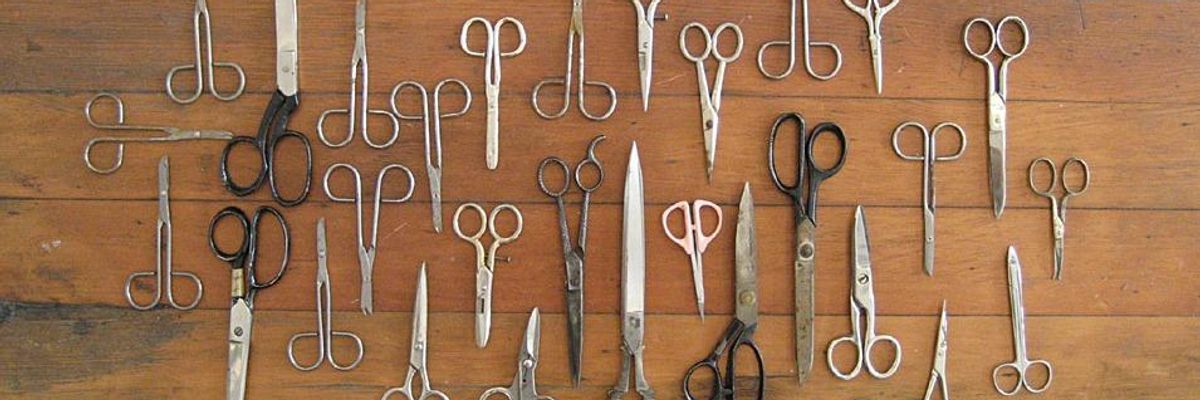Cutting federal spending doesn't "save money" - certainly not the way conservatives in Congress and in the states have been doing it.
If you cut the Internal Revenue Service budget, that obviously increases the deficit because it lowers the government's ability to collect tax revenue. If you cut the infrastructure budget, obviously after a while bridges start to fall down. That costs money. And lives.
And, of course, if you cut the health and research budgets, diseases can spread and cures are not found. An article in Scientific American magazine by an infectious disease specialist spells out the consequences as the United States deals with the threat of the Ebola virus:
NIH's [National Institute of Health] budget was reduced by $446 million from 2010 to 2014, and subjected to inappropriate politically motivated interference in its decision making. The CDC's [Centers for Disease Control] discretionary funding was cut by $585 million during this same period. Shockingly, annual funding for the CDC's public health preparedness and response efforts were $1 billion lower for 2013 fiscal year than for 2002. These funding decreases have resulted in more than 45,700 job losses at state and local health departments since 2008. Again, it is not just the Ebola that is a looming threat. We need to worry about vaccine-preventable but neglected infections like influenza, measles, and whooping cough; the serious emerging viral infections in the US like Enterovirus-D68, chikungunya and dengue, as well as overseas MERS and bird flus, and natural disasters.
For all you Republicans out there, here's the thing: When us "takers" get diseases, they can spread to you "makers." We actually are all in this together.
Cutting Food For Seniors Puts Them In The Hospital
In last year's "Here's A Sequester Cut You'll Feel In Your Gut," I wrote about how Republican cuts in food aid for seniors actually causes the government to spend more, because of what happens to seniors when you stop giving them food.
First Came The Cuts
January, 2011: The cuts.
Fort Wayne Journal Gazette, "Cuts hit Meals on Wheels":
The Times of Munster reports that about 100 seniors whose meals had been funded will see those meals reduced or eliminated entirely under the cuts announced this month by Northwest Indiana Community Action Corp. ... funding has also been cut for a program that provides extra meals during the winter so clients can refrigerate them in their homes in case poor weather interrupts regular meal delivery.
Besides reducing meals, Noe says the cuts also add to the isolation of some seniors by reducing or eliminating their socialization with food delivery crews.
Valparaiso Merriville Community.com, "Funding cuts impact senior meals":
Meals on Wheels prepares nearly 2,000 meals each day for Lake County senior citizens in need.
Yes, that's how bad things are out there, just one county in Indiana has 2,000 seniors who need this program. That is not academic. That is real.
Then Came The Results
September, 2011: The results.
Indiana Economic Digest, "Cutbacks leave low-income seniors 'in a bad situation'":
More than one-third of respondents in the March survey conducted of Meals on Wheels clients whose meals were reduced reported losing weight after the cuts and one-quarter claimed to be "food insecure," fearful of running out of food or going hungry.
Wait, did you read that right? It's so bad out there that seniors who suffered these cuts had to literally stop eating? One-third "reported losing weight after the cuts?" And another one-fourth on top of that were "fearful of running out of food or going hungry?"
And now, with these results in front of their faces, they are forcing even more cuts?
The cuts don't actually "cut" -- they increase spending.
Taking Money Out Of The Economy Actually Takes Money Out Of The Economy
Back when he was chairman of the Federal Reserve Ben Bernanke warned that the foolish Republican cuts were slowing the economy, which costs money. The "sequester" cuts were slowing the economy by 1.5 percent, costing us all.
Federal Reserve Chairman Ben Bernanke told the House Financial Services Committee on Wednesday, the abrupt spending cuts this year could slow economic growth by 1.5 percentage points, which would reduce tax revenue. "Besides having adverse effects on jobs and incomes, a slower recovery would lead to less actual deficit reduction in the short run for any given set of fiscal actions," he said.
Yes, taking money out of the economy actually takes money out of the economy, and that costs money. Yes, cutting the budget for fixing roads and bridges actually means they start to fall apart, and that costs money. Yes, cutting the food budget for seniors puts them in the hospital and in care facilities, and that costs money. Yes, cutting the health budget has an impact on our health, and that costs lives. Duh.
In the end it doesn't matter how many slogans about "personal responsibility" and "makers and takers" you use to justify demonizing government spending on things that make all of our lives better (and thereby cutting your taxes). Bridges will still fall down if they are not maintained. And you will still get sick if contagious diseases are not kept in check.
